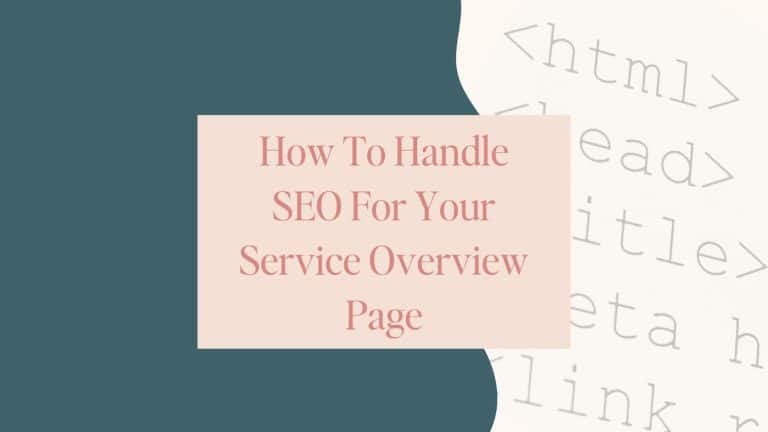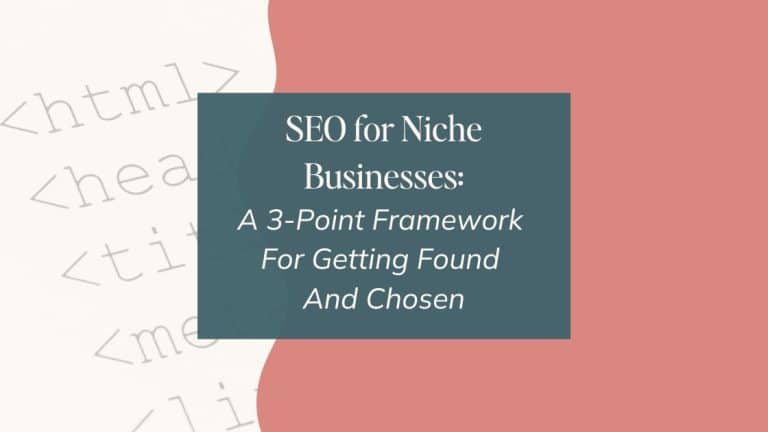
Subscribe to get your FREE Copy of the SEO SIMPLIFIED keyword research workbook.
Jump To:
I was recently on The Marketing Freelancer podcast discussing SEO for freelance service providers.
Emily Reagan, host of the podcast, asked me a question that gets to the heart of why most freelancers struggle with search: “Why is SEO so intimidating to the average business owner?”
My answer? People think Search Engine Optimization requires technical expertise. They picture complex code, mysterious algorithms, and hours spent optimizing meta tags.
But here’s what I’ve learned after helping dozens of service providers build their search presence: the biggest SEO wins for freelancers have nothing to do with technical skills.
On the podcast, I shared three strategies that focus on exactly that. The practical steps that don’t require technical expertise but can dramatically improve how clients find you online.
I’m expanding on those same strategies here.
Listen to the full episode
This blog post covers the three core SEO strategies we discussed, but the podcast episode goes much deeper.
Emily and I talked about how to actually measure if your SEO is working, realistic timelines for seeing results, and the three types of cornerstone blog posts every freelancer should create.
We also covered why platform diversification matters now more than ever and how AI tools like ChatGPT are changing the search landscape.
Listen to the full episode for the complete conversation and practical details we couldn’t fit in this post.
Listen on Apple Podcasts or visit the official show notes.
1. Make Sure You're Actually Saying What You Do (In Language Your Clients Use)
This sounds obvious, but it’s the most common mistake I see. Freelancers often describe their services in industry slang or assume potential clients will connect the dots between what they offer and what people actually need.
Here’s a quick test: go to your homepage and use “Command + F” (or “Control + F” on PC) to search for the exact words your ideal clients would type into Google when looking for your services.
If you’re a website designer who specializes in creating Kajabi websites, does your homepage actually say “Kajabi website designer”? If you’re a Facebook ads manager, do you use the exact words “Facebook ads manager” on your website?
Why this matters for SEO: Google needs to understand what you do before it can show you to people searching for those services. When your messaging is vague or too creative, you’re making it harder for both search engines and potential clients to find you.
The voice-of-customer connection: The words you use should match how your clients describe their problems. If they’re searching for “help with email marketing” but your site only mentions “strategic communication solutions,” you’re speaking different languages.
Start by listening to how your best clients describe what you do. Pay attention to the language they use in testimonials, intake forms, or casual conversations. Those phrases? That’s your SEO gold.
2. Lean Into Local SEO (Even If You Work Remotely)
Many freelancers overlook local SEO because they work with clients everywhere. But here’s what they’re missing: local search is often less competitive and can connect you with high-quality clients in your area.
Even if you work remotely, there are advantages to showing up in local search results.
Local clients might prefer working with someone nearby for meetings, events, or simply the relatability of proximity.
Plus, local SEO can be your secret weapon for ranking in a space where you’re not competing with every freelancer globally.
How to approach local SEO as a freelancer:
- Claim your Google Business Profile and fill out every section. Yes, even if you work from home. You can list your city without showing your exact address.
- Include location-based keywords naturally in your content. “Brand strategist in Portland” or “email copywriter serving Austin businesses” can help you capture local searches.
- Get involved in local business communities and earn mentions or links from local business directories, chambers of commerce, or networking organizations.
The goal isn’t to limit yourself to local clients. It’s to stand out in a smaller, less competitive space while you build authority for broader keywords.
3. Create Top-of-Funnel Content That Solves Real Problems
Most freelancers either don’t blog at all, or they write about what interests them instead of what their clients are actually searching for. Strategic content creation is where freelancers can really set themselves apart.
Content serves multiple purposes in your SEO strategy. It helps you target specific SEO keywords, builds topical authority in your niche, and gives potential clients a reason to stay on your site and trust your expertise.
Focus on top-of-funnel content first. These are the searches people make when they’re problem-aware but don’t yet know they need to hire someone like you.
The key is solving problems before selling solutions. When someone finds your blog post through organic search, they’re getting value before they even know you’re available to hire. That builds trust and positions you as the expert they’ll think of when they’re ready to get help.
Make your content binge-worthy. Internal linking between related posts keeps people on your site longer, which Google notices. More importantly, it helps potential clients see the depth of your expertise across multiple touchpoints.
Start Where You Are, Not Where You Think You Should Be
You don’t need to rank #1 for broad, competitive keywords like “marketing consultant” or “graphic designer.” That’s not realistic, and it’s not necessary.
The opportunity is in long-tail, specific searches. “Health and wellness copywriter.” “Virtual assistant for startups.” “Brand designer for small businesses.”
These searches have less competition, higher intent, and they connect you with people who are looking for exactly what you offer.
Somebody is ranking for the services you provide and with the right approach, that somebody can be you.
SEO Strategy In An Evolving Search Landscape
SEO has evolved.
There was a time when smart keyword placement alone could get you ranked.
Now, Google prioritizes brand reputation and off-site credibility signals, things that are harder to fake.
This actually works in favor of freelancers who take a strategic approach by building a robust, authentic presence across multiple platforms.
When someone Googles your name or your services, Google should see consistent signals across your website, your LinkedIn, guest posts you’ve written, podcasts you’ve appeared on, testimonials from real clients. It all works together to build your authority in search results.
Even with AI tools like ChatGPT changing how people find information, the fundamentals remain the same.
Clear, well-organized content from trusted sources gets prioritized, whether that’s in traditional search results or AI-generated answers.
Building SEO That Works for Your Business
When you clearly communicate what you do, leverage local opportunities, and create helpful content, you’re building a foundation that works while you’re focused on client work.
Your website should be more than a digital business card. It should be a dynamic asset working nonstop to attract the right clients, showcase your expertise, and support your business goals.
Ready to figure out what your ideal clients are actually searching for?
SEO Simplified is my free keyword research workbook that walks you through finding the exact words and phrases your potential clients use when they’re looking for your services. It’s designed specifically for service providers who want to get found (without needing to become an SEO expert).
Download SEO Simplified here and start building visibility that actually connects you with clients ready to hire.








